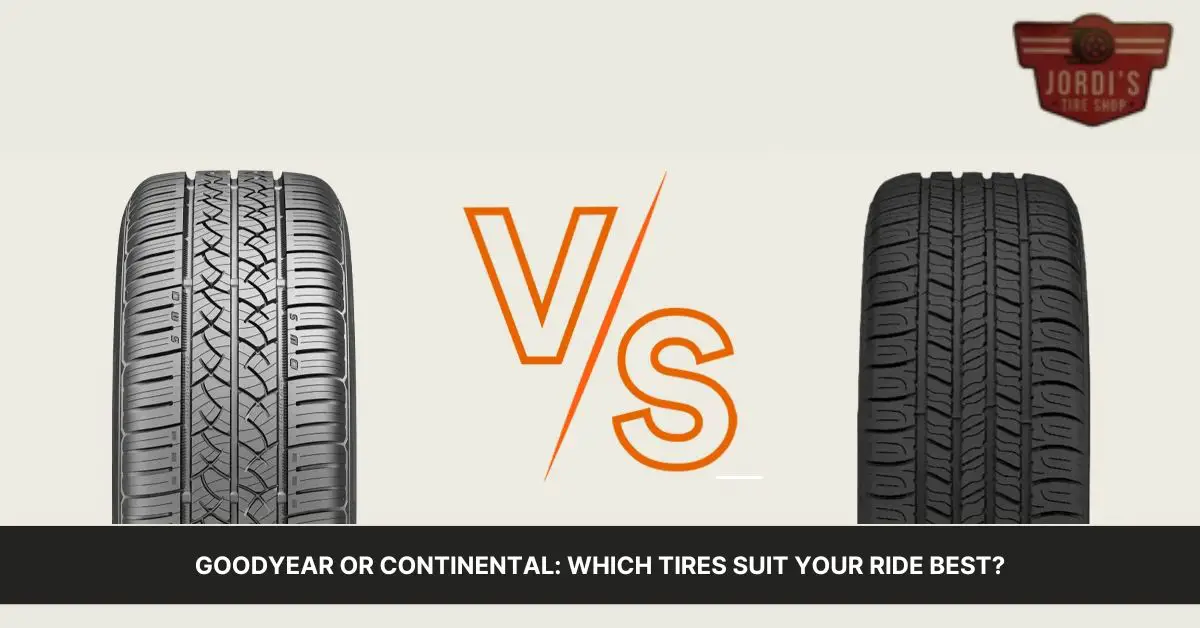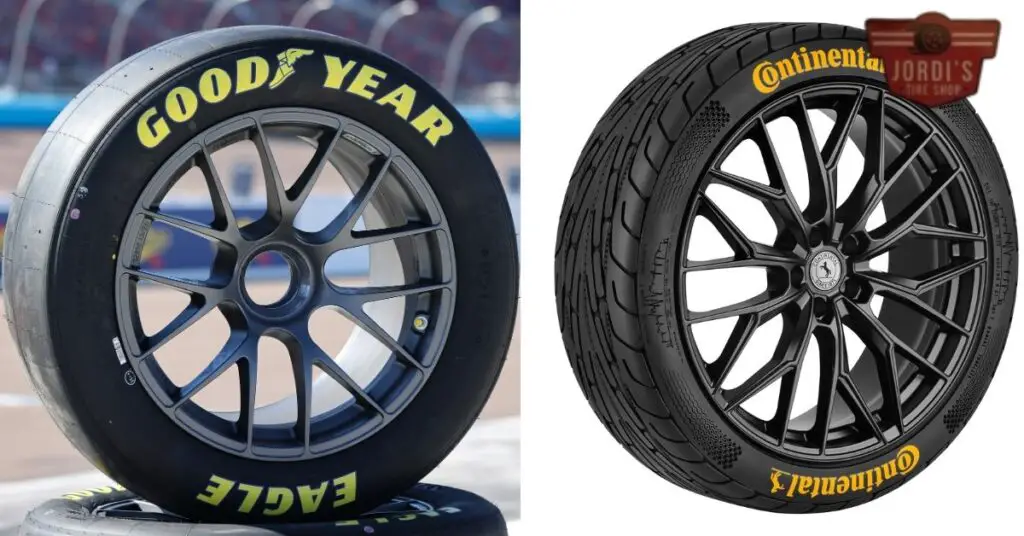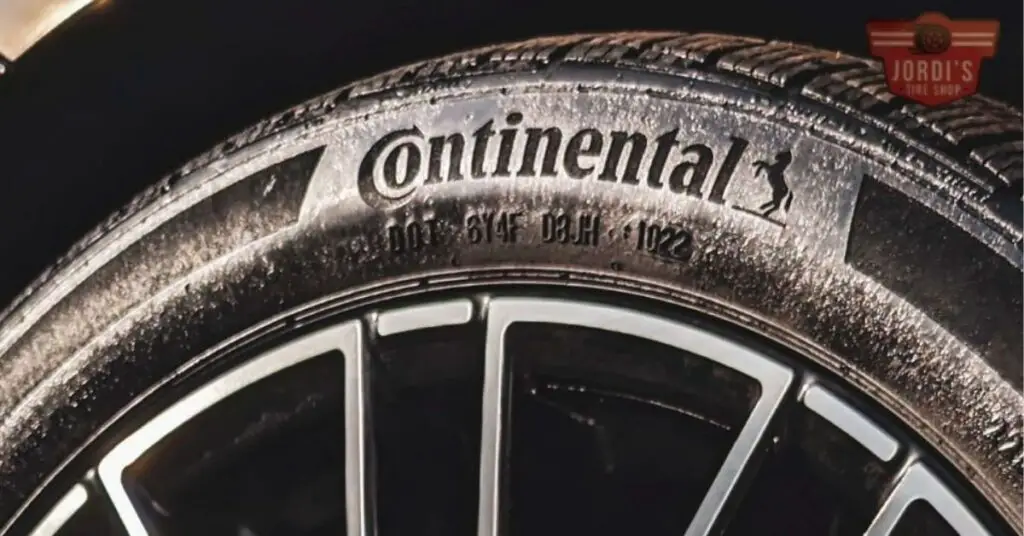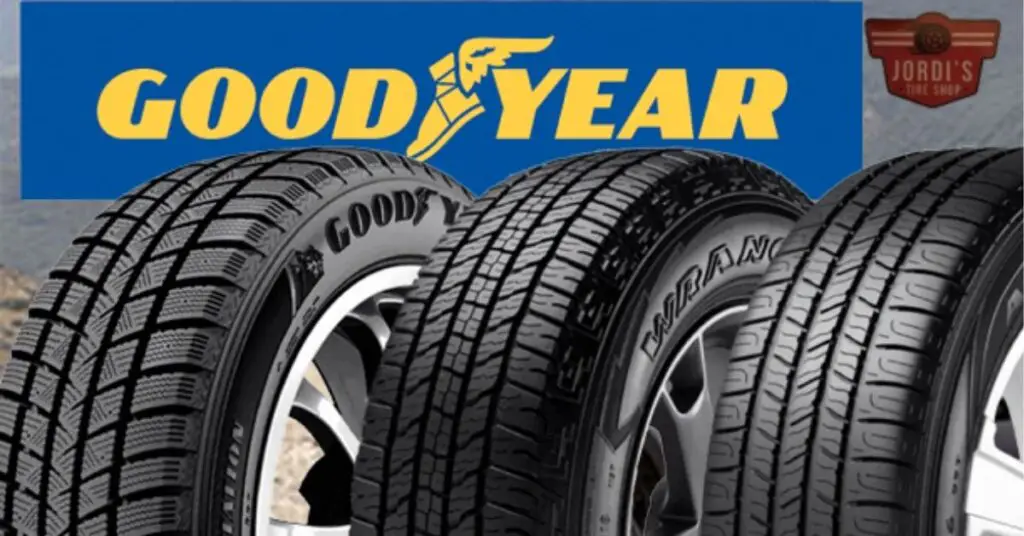When you’re in the market for new tires, you’re likely to come across two big names: Goodyear and Continental. Both brands have a storied history and are known for their commitment to quality, but which one is the right choice for you?
In the industry of tires, it’s not always about which brand is ‘better’, but rather, which brand suits your exact needs best. Whether it’s durability, performance, or value for money, each brand has its unique strengths.
Understanding Continental and Goodyear Tire Brands
Knowing the background of Continental and Goodyear tire brands plays a crucial role in identifying the most suitable option for you. We’re here to provide the information on these well-respected tire brands.
Brief History of Continental Tires
Continental AG, first setting up production in 1871, found its origin in Hanover, Germany. Originally, they produced rubberized fabrics and solid tires for carriages and bicycles. But, as the automobile industry took off, Continental shifted gears and started producing automobile tires in 1898. The brand innovated impressively, introducing the industry’s first tread pattern tire by the year 1904.
Brief History of Goodyear Tires
Henry Goodyear set up the Goodyear Tire and Rubber Company in 1898, similar to the starting year of Continental in the automobile industry. Headquartered in Akron, Ohio, the company shot to fame for several innovations. Unveiling of the first tubeless auto tire might be the most monumental one in 1903. The brand’s commitment to innovation hasn’t ebbed, as it continues to produce top-tier tires that cater to all types of vehicles and travel conditions.
Key Factors to Consider When Choosing Tires
In the process of choosing between Goodyear and Continental tires, it’s crucial to consider several key factors. These factors cover the type of tire, size, driving conditions, and vehicle type. Let’s explore these aspects in greater detail.
Tire Type
Selection of tire type depends on your vehicle specifics and personal needs. Two primary types: performance tires and all season tires. Performance tires, like Continental’s SportContact 6, excel in dry and wet conditions, offering maximum grip and impressive handling. All-season tires like Goodyear’s Assurance WeatherReady, on the other hand, are designed for year-round use, providing stable traction in various weather conditions.
Tire Size
Tire size directly influences your vehicle’s road performance. It’s reflected in a series of numbers on the tire sidewall. For example, “P215/65R15 95H” is a common tire size. “P” denotes passenger vehicle, “215” is the tire width in millimeters, “65” represents the aspect ratio, “R” stands for radial construction, “15” signifies the wheel diameter in inches, and “95H” indicates the speed rating. Check your vehicle’s manual or look on the driver’s side door jamb for optimum tire size specifications.
Driving Conditions
Your driving conditions— including weather and terrain— dramatically shape your tire choice. For snow-dominated regions, Goodyear’s Ultra Grip winter tires are a safe bet. Elsewhere, if you frequently tackle wet and demanding roadways, consider Continental’s ContiPremiumContact™ 5, known for its strong wet grip and short braking distances.
Vehicle Type
Vehicle type is another decisive factor in tire selection. Passenger cars and minivans generally use smaller tire sizes, while SUVs and trucks require larger, more robust tires. Performance vehicles demand high-performance tires like Goodyear’s Eagle F1 SuperCar 3R for their high-speed capabilities. For SUVs and trucks, Continental’s TerrainContact A/T is an excellent choice due to its excellent off-road traction and durability.
Comparing Goodyear and Continental Tires
Exploring deeper into the comparison, the focus shifts to exact tire categories from these accomplished brands, Goodyear and Continental.
Goodyear vs Continental: Performance Tires
For those looking for high-speed stability and improved handling, performance tires are the go-to options. Featuring a blend of precise handling and responsiveness, Continental’s SportContact 6 emerges as a strong competitor. It’s known for its superior dry and wet traction. Notably, Goodyear’s Eagle F1 Asymmetric 3 is another standout in this category. It’s designed for powerful, sporty vehicles and boasts strong grip and short braking distances even at high speeds. Both shine in their own ways, but your choice depends on the exact requirements of your ride and driving conditions.
Goodyear vs Continental: All-Season Tires
All-season tires are about versatility and Goodyear’s Assurance WeatherReady stands as a testament to this. Its tread design and rubber compounds ensure reliable traction regardless of the seasonal changes. On the other hand, Continental’s PureContact LS excels in providing a balance of comfort, fuel efficiency, and year-round performance. Again, the call between them comes down to individual preferences and whether you value high-mileage, fuel-efficiency, or a safer ride during adverse weather conditions.
Goodyear vs Continental: Winter Tires
For those residing in snowy regions, winter tires are indispensable. Goodyear’s Ultra Grip winter tire range offers exceptional winter traction, making them ideal for handling snow-laden roads. Comparatively, Continental’s VikingContact 7 demonstrates excellent performance on icy and snowy pavement, ensuring safer braking and handling. Assess the severity of winter weather typical of your region and decide which brand’s winter tire offerings better aligns with your needs.
Customer Opinion and Feedback
Diving into customer opinions, we’ve gathered data from user ratings and reviews. Here, you’ll discover how real-industry drivers feel about tires from both Goodyear and Continental.
Goodyear Tires: User Ratings and Reviews
Goodyear tires often receive high ratings for durability and performance across many terrain types. For example, the Assurance WeatherReady all-season tire boasts an average rating of 4.3 out of 5, signifying its high approval among customers for its resilience across weather fronts and road conditions. The Eagle F1 Asymmetric 3, a performance tire, equally relishes sterling reviews, with most users applauding its strong grip and short braking distances. But, it’s worth mentioning that, even though its high reviews, a minor number of users have raised concerns about the tire’s noise level.
| Goodyear Tires Model | Average Rating |
|---|---|
| Assurance WeatherReady | 4.3 out of 5 |
| Eagle F1 Asymmetric 3 | 4.2 out of 5 |
| Ultra Grip Winter | 4.0 out of 5 |
Continental Tires: User Ratings and Reviews
On the other hand, Continental tires are often praised for their balance of comfort, fuel efficiency, and adept performance on icy roads. Continental’s SportContact 6, a performance optimized tire, carries an average rating of 4.1 out of 5, showcasing satisfaction in its remarkable traction. Continental’s PureContact LS, an all-season variant, also clinched high ratings, sitting at an average of 4.3 out of 5, thanks to its comfort-fuel efficiency balance. The VikingContact 7, widely recognized for its stellar performance on icy roads, equally commands impressive reviews. But, a few customers have pointed out that these tires could offer better tread life.
| Continental Tires Model | Average Rating |
|---|---|
| SportContact 6 | 4.1 out of 5 |
| PureContact LS | 4.3 out of 5 |
| VikingContact 7 | 4.2 out of 5 |
Summarizing, customers’ feedback showcases substantial satisfaction across both Goodyear and Continental tire ranges. Yet, it remains imperative to consult your exact driving needs and conditions when making a choice, as the best tire for you depends largely on these factors.
Price Comparison: Goodyear vs Continental Tires
Knowing which tire aligns with your budget holds importance equal to determining its fit for your driving needs and vehicle type. Prices fluctuate between Continental and Goodyear tires, stemming from factors such as size, comparable models, and additional features.
Dedicated sports car owners favor Goodyear’s Eagle F1 Asymmetric 3 and Continental’s SportContact 6. The Eagle F1 Asymmetric 3 by Goodyear tags at around $120 per tire just like the SportContact 6 from Continental; but, larger sizes may reach up to $300 for both brands.
For everyday sedans, Continental’s PureContact LS, which costs approximately $135 per tire, finds competition in Goodyear’s Assurance WeatherReady, typically priced at $150. Prices climb if you opt for larger tire sizes, with potential tags reaching $215 for the PureContact LS and $240 for the Assurance WeatherReady.
When harsh winter conditions strike, the Goodyear Ultra Grip range, priced from $60 to $120, and the VikingContact 7 by Continental, ranging from $65 to $190, provide trusty options. The leap in price, conditioned by tire size and exact model, explains the price variance between these winter focused tires.
Keep in mind, these prices serve as average estimates and the exact retailer, sales, and location might lead to variations in the final cost. It’s not about choosing a cheaper tire; it’s about finding the one that provides good value for your money, aligning well with your exact driving needs and conditions.
Warranty and Services Provided
Plus to exceptional product quality, both Goodyear and Continental offer comprehensive warranty programs and services. By evaluating warranty terms and coverage, you can gauge how confident these manufacturers are in the durability and longevity of their tires.
Goodyear Tire Warranty
Goodyear stands behind its products by offering an extensive warranty program. All new Goodyear passenger and light truck tires come with a Limited Tread Life Warranty, ranging from 20,000 to 80,000 miles, depending on the model. Also, Goodyear provides a 6-year warranty on material and workmanship issues, including free replacement within the first year of use or the first 2/32 of treadwear. Beyond this, prorated service charges apply. Alongside these warranties, Goodyear also offers free tire inspections and air pressure check services at their authorized service centers.
Continental Tire Warranty
Continental, too, shows faith in their products with robust warranty plans. They include the Total Confidence Plan, a set of warranty services that provide an extra level of protection for tire owners. This plan covers defects in materials and workmanship for up to 6 years, with free replacement for the first year or the first 2/32 inch of treadwear. After this, a prorated amount is applied. The Total Confidence Plan also features a tread life warranty, though mileage varies based on the tire model. As part of its service package, Continental offers road hazard coverage, providing free replacement within the first 12 months if damage during normal use. Finally, Continental includes complimentary flat tire roadside assistance, adding an additional layer of security for tire owners.
When selecting between Goodyear and Continental, don’t simply opt for the tires. Instead, consider the value-added benefits the warranty programs and coverage bring to the table.
Where to Buy: Goodyear and Continental Tires
When it comes to purchasing Goodyear or Continental tires, you’ve got many options. The most obvious ones are from tire-exact retailers, such as Discount Tire, Tire Rack and Big O Tires. All of these outlets carry a wide selection of both Goodyear and Continental tires, across different tire types and sizes. Also, each of these retailers offers online purchasing, enabling the integration of the digital industry and the physical one.
Beyond tire-exact retailers, there’s also a universe of general automotive retailers. Stores like Walmart and Amazon are perfect examples. Even though these are not specialized auto part stores, they do boast substantial tire sections. Again, both Goodyear and Continental tires feature prominently. Prices can vary, depending often on the size, model, and features of the tire you are eyeing. So, these retailers offer yet another platform for comparing prices and purchasing your desired tires.
Car dealerships also provide options for the tire brand purchase. If your dealership sells unique brands, that dealership likely has a partnership with tire manufacturers. For example, BMW is known to equip its vehicles with Continental tires. So, your local BMW dealership may offer an option to purchase replacement tires directly from them. Goodyear has similar partnerships with Ford and Chevrolet. Hence, it’s a good idea to check with your vehicle’s dealership.
Finally, for ultimate convenience, direct online purchase from Goodyear and Continental websites is another viable option. Simply head for the “shop” or “product” section on their respective websites, and you’ll be able to pick from the expansive selection of the tires that each brand offers. An added perk to this is that you get a chance to directly see any ongoing deals or promotions from the manufacturers.
Whichever purchasing method you opt for, ensure it’s reputable and dependable. It’s vital considering you’re buying a product that significantly contributes to your safety while driving. Remember, a good tire purchase will pay you back in terms of comfort, fuel efficiency, and a smooth ride. Your own driving needs and conditions should also be a major consideration in choosing where to buy your tires. It’s not about whether Goodyear or Continental is a better brand overall; it’s about whether Goodyear or Continental is the better brand for you.
Conclusion
Choosing between Goodyear and Continental tires isn’t about finding the superior brand, but about finding what’s best for your needs. Both have a long-standing reputation for quality and innovation. Remember, factors like tire type, size, driving conditions, and vehicle type are key to your decision. Performance, all-season, or winter tires – both brands have something to offer.
Goodyear shines in durability and performance, while Continental scores high on comfort and fuel efficiency. Yet, it’s crucial to consider user feedback about noise levels and tread life. Price-wise, you’ll find variations, but the focus should be on value for money.
Don’t overlook the warranty and services offered by both brands. Goodyear’s Limited Tread Life Warranty and Continental’s Total Confidence Plan are worth considering. Finally, choose a reputable purchasing option that suits you, be it specialized tire retailers, general retailers, or directly from the manufacturers. Your driving needs and conditions should always guide your tire selection.
Q1: Which tire brand is superior: Goodyear or Continental?
The article emphasizes that no brand can be deemed “superior” outright. The choice between Goodyear and Continental mainly relies on individual driving needs, conditions, and what you prioritize, such as performance, durability, or overall value for money.
Q2: What is the historical background of Goodyear and Continental?
Initially, Continental AG started production of rubberized fabrics in 1871, then transitioned to automobile tires in 1898. Goodyear Tire and Rubber Company was established in 1898 and is known for innovation, including creating the first tubeless auto tire.
Q3: Could you provide some examples of specific tire categories in Goodyear and Continental?
Both brands excel in different tire categories. In performance tires, Continental’s SportContact 6 offers superior traction, and Goodyear’s Eagle F1 Asymmetric 3 is designed for sporty vehicles. As for all-season tires, Goodyear’s Assurance WeatherReady provides versatility, while Continental’s PureContact LS shines in comfort and fuel efficiency.
Q4: What are customers’ opinions on Goodyear and Continental tires?
Goodyear tires are generally commended for durability and performance. Continental tires, on the other hand, are appreciated for comfort and fuel efficiency. However, users have shared concerns about tread life for Continental and noise levels for Goodyear.
Q5: How do the prices of Goodyear and Continental tires compare?
Prices of both brands depend on tire size, model, and features. Performance tires for both brands hover around $120 – $300. In everyday sedans, the cost is approximately $135 for Continental’s PureContact LS and around $150 for Goodyear’s Assurance WeatherReady.
Q6: What warranties and services do Goodyear and Continental brands provide?
Goodyear provides a Limited Tread Life Warranty and a 6-year warranty on material and workmanship. Continental offers a Total Confidence Plan that covers defects with additional benefits like road hazard coverage and roadside assistance.
Q7: Where can I purchase Goodyear and Continental tires?
Both Goodyear and Continental tires can be purchased from specialized tire retailers, general retailers, and car dealerships. Buying directly from the manufacturers’ websites could also allow access to ongoing deals and promotions.
Related Posts:
- Arizonian Vs Goodyear Tires: An In-Depth Comparison for the American Driver
- Bridgestone vs Michelin: Unveiling the Best Tires for Your Drive
- Goodyear or Continental: Which Tires Suit Your Ride Best?
- Goodyear or Hankook Tires? An In-depth Comparison For the Smart American Driver
- TRQ Auto Parts: Unveiling the Truth About Their Quality & Reliability
- Steer Clear: The Wheel Bearing Brands That Could Cost You in the Long Run
















